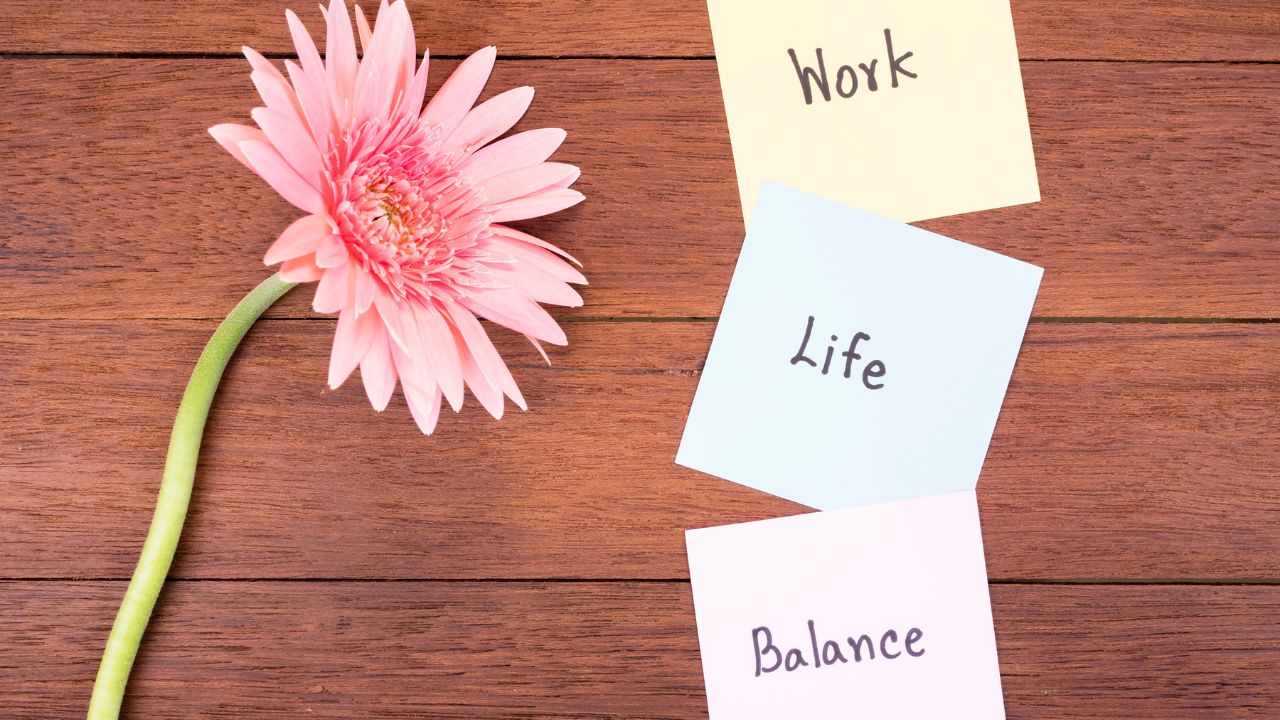Modern life is busy, demanding, and constantly connected. The boundary between work and personal life has blurred, especially since remote work and hybrid jobs became the norm. Laptops and smartphones mean that emails follow us home, notifications interrupt dinner, and projects spill into weekends. For many, “switching off” feels impossible.
This constant connectivity has a cost. Burnout, stress, and declining productivity are on the rise globally. People find themselves working longer hours but achieving less, feeling guilty when they rest, and struggling to be fully present with family or friends. The irony is clear: the more we try to maximise productivity without balance, the less effective and happy we become.
Work-life balance doesn’t mean dividing your hours perfectly or avoiding work pressures altogether. It means finding a rhythm where your career supports your personal wellbeing rather than consuming it. With thoughtful choices, it is possible to stay productive at work without sacrificing health, relationships, or joy.
The Importance of Balance
At first glance, the idea of balance might sound like a luxury. But research shows it is essential for both productivity and long-term health. When people overwork, they experience declining focus, poorer decision-making, and reduced creativity. Stress hormones build up, leading to exhaustion, insomnia, and health problems. In contrast, when individuals protect rest and recreation, their performance at work actually improves.
Balance is not about working less—it’s about working smarter, setting boundaries, and creating time for rest and renewal. It’s also about recognising that productivity is not measured by hours at a desk, but by the quality of work produced.
Recognising the Signs of Burnout
The first step to achieving balance is recognising when things are out of sync. Burnout doesn’t happen overnight—it builds gradually. Warning signs include constant fatigue, irritability, reduced motivation, and difficulty focusing. Work tasks may feel overwhelming, even simple ones. Physical symptoms such as headaches, stomach problems, or frequent illnesses may appear.
Acknowledging burnout is not a weakness. It’s an early signal from your body and mind that you need to reset. Ignoring these signals can lead to long-term damage, but addressing them early allows recovery and healthier routines.
Practical Ways to Create Balance
Setting Boundaries Around Work
The most effective strategy is learning to separate work from personal life, even when working remotely. This could mean creating a dedicated workspace at home, setting clear working hours, and resisting the urge to constantly check emails after hours. Communicating boundaries with colleagues helps manage expectations.
For example, many professionals now use “focus hours” for deep work and silence notifications outside core times. Even managers increasingly respect these boundaries, realising that a rested employee is more valuable than an exhausted one.
Managing Time Wisely
Time management is less about squeezing more into each day and more about prioritisation. Tools such as task lists, calendars, or digital apps help, but the real trick is knowing what truly matters. Not every email needs a response within minutes, and not every meeting requires your presence.
The 80/20 rule, where 80% of results come from 20% of efforts, applies well here. By focusing on high-impact tasks, you achieve more without adding hours.
Learning to Rest Guilt-Free
Rest is not laziness; it is fuel for productivity. Many people push themselves relentlessly, believing that rest is wasted time. In reality, short breaks, adequate sleep, and leisure activities sharpen the mind. Activities such as reading, walking, or even mindful breathing refresh mental energy and creativity.
Countries and companies that encourage proper rest consistently report higher employee satisfaction and performance. Individuals should give themselves the same permission.
Staying Physically Healthy
The body is the foundation of productivity. Simple habits, balanced nutrition, regular exercise, and proper sleep, directly affect energy levels and focus. Skipping meals, sitting for long hours, and neglecting movement may seem harmless in the short term, but they build fatigue and stress over time.
Even small adjustments, like a daily 20-minute walk, drinking more water, or keeping a consistent sleep schedule, dramatically improve resilience.
Nurturing Personal Relationships
Work may provide income and structure, but relationships provide meaning. Spending time with family and friends is one of the strongest buffers against stress. Yet, these relationships often suffer first when work expands unchecked.
Prioritising personal connections, even through simple acts like sharing a meal, making a phone call, or scheduling family time, reminds us that life is bigger than deadlines. Strong relationships also create support systems during difficult periods, making us better equipped to handle work pressures.
The Role of Technology in Balance
Technology is both a challenge and a solution. On one hand, constant notifications tether us to work. On the other hand, apps and tools can help manage tasks, block distractions, and automate repetitive work.
The key is mindful use. Turn off unnecessary notifications, schedule “digital detox” times, and use apps intentionally. Instead of letting devices dictate your schedule, train yourself to control when and how you engage with them.
Work-Life Balance as a Career Strategy
It’s worth remembering that balance is not just about surviving the present but also about building a sustainable career. Many high achievers burn out early, damaging long-term potential. Those who manage balance tend to last longer, grow steadily, and enjoy healthier lives.
Employers are also beginning to value balance. Flexible hours, hybrid work models, and wellness programmes are increasingly common. Professionals who set boundaries often earn respect, demonstrating that they manage time effectively and deliver quality results without overextension.
Small Shifts That Make a Big Difference
The beauty of balance is that it doesn’t require dramatic changes. Small adjustments add up: leaving your desk for a proper lunch, scheduling exercise like an appointment, switching off devices an hour before bed, or saying “no” to non-essential commitments.
Each choice carves out a little more space for wellbeing. Over time, these choices become habits, and habits become a lifestyle. The shift doesn’t just make you more productive; it makes life more enjoyable.
Work-life balance is not a destination but an ongoing practice. Demands will shift, workloads will rise and fall, and personal circumstances will change. What matters is building habits that protect your energy, health, and happiness while allowing you to remain effective at work.
The real measure of success is not how much time you spend working, but whether your work supports the life you want to live. Productivity without well-being is hollow. By setting boundaries, managing time, caring for your health, and nurturing relationships, you can stay productive without burning out—building not only a stronger career but also a richer, more meaningful life.








Leave a Comment